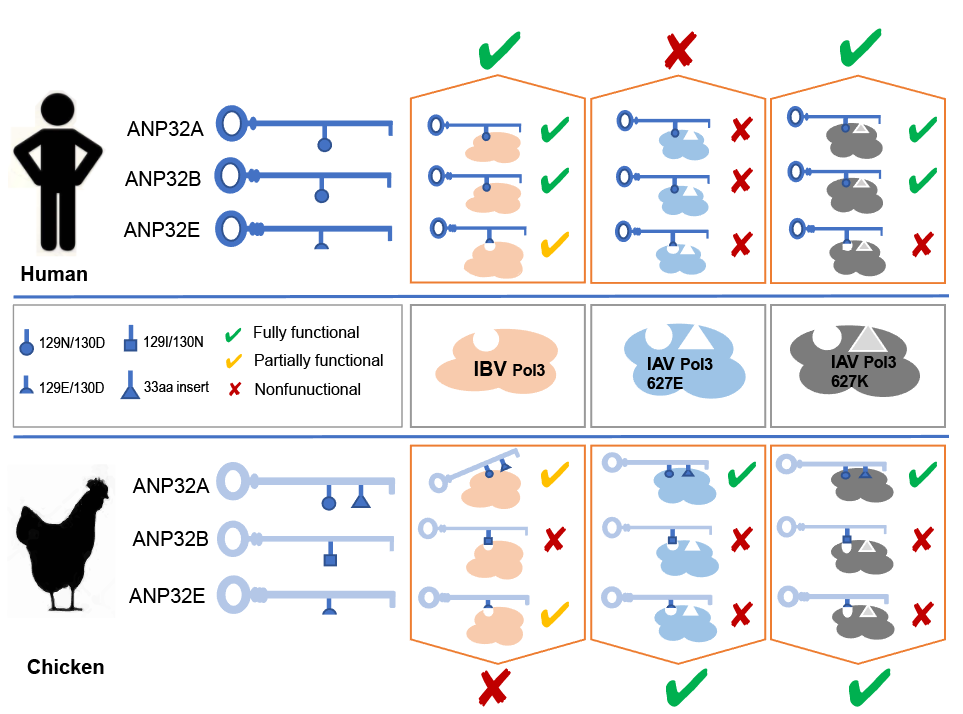Selective Usage of ANP32 Proteins by Influenza B Virus Polymerase: Implications in Determination of Host Range
Recently, a group of researchers led by Dr. Wang Xiaojun from Harbin Veterinary Research Institute (HVRI) of Chinese Academy of Agricultural Sciences (CAAS), revealed an important role for ANP32 proteins in IBV polymerase activity and suggested the possible molecular basis of adaptation and restriction of IBV infection in different species. The article was published in “PLoS Pathogens (ppat.1008989)”.

The influenza B virus (IBV) causes seasonal influenza and has accounted for an increasing proportion of influenza outbreaks. IBV mainly causes human infections and has not been found to spread in poultry. The replication mechanism and the determinants of interspecies transmission of IBV are largely unknown. In this study, the authors found that the host ANP32 proteins are required for the function of the IBV polymerase. Human ANP32A/B strongly supports IBV replication, while ANP32E has a limited role. Unlike human ANP32A/B, chicken ANP32A has low support activity to IBV polymerase because of a unique 33-amino-acid insert, which, in contrast, exhibits species specific support to avian influenza A virus (IAV) replication. Chicken ANP32B and ANP32E have even lower activity compared with human ANP32B/E due to specific amino acid substitutions at sites 129-130. The authors further revealed that the sites 129-130 affected the binding ability of ANP32B/E to IBV polymerase, while the 33-amino-acid insert of chicken ANP32A reduced its binding stability and affinity. Taken together, the features of avian ANP32 proteins limited their abilities to support IBV polymerase, which could prevent efficient replication of IBV in chicken cells. These results illustrate roles of ANP32 proteins in supporting IBV replication and may help to understand the ineffective replication of IBV in birds.
This study was supported by the grants from the Natural Science Foundation of China to Wang Xiaojun (as a part of grant to Dr. Chen Hualan’s grant: 31521005) and Zhang Zhenyu (31702269) and the Natural Science Foundation of Heilongjiang Province to Wang Xiaojun (No. JC2018010). More details are available on the link below: https://journals.plos.org/plospathogens/article?id=10.1371/journal.ppat.1008989
By Zhang Zhenyu (zhangzhenyu@caas.cn)
-
 Apr 18, 2024Opening Ceremony of the Training Workshop on Wheat Head Scab Resistance Breeding and Pest Control in Africa Held in CAAS
Apr 18, 2024Opening Ceremony of the Training Workshop on Wheat Head Scab Resistance Breeding and Pest Control in Africa Held in CAAS -
 Apr 03, 2024IPPCAAS Co-organized the Training Workshop on Management and Application of Biopesticides in Nepal
Apr 03, 2024IPPCAAS Co-organized the Training Workshop on Management and Application of Biopesticides in Nepal -
 Mar 28, 2024Delegation from the School of Agriculture and Food Science of University College Dublin, Ireland Visit to IAS, CAAS
Mar 28, 2024Delegation from the School of Agriculture and Food Science of University College Dublin, Ireland Visit to IAS, CAAS -
 Mar 25, 2024Director of World Food Prize Foundation visited GSCAAS
Mar 25, 2024Director of World Food Prize Foundation visited GSCAAS -
 Mar 20, 2024Institute of Crop Sciences (ICS) and Syngenta Group Global Seeds Advance Collaborative Research in the Seed Industry
Mar 20, 2024Institute of Crop Sciences (ICS) and Syngenta Group Global Seeds Advance Collaborative Research in the Seed Industry
